Degree Programs
Master of Arts in Christian Education (M.A.C.E.)
Charlotte & Richmond CampusesThe purpose of the M.A.C.E. degree program is to prepare you to become a professional educator in Christian congregations or other educational settings. Graduates serve in various capacities and ministerial settings: churches, camps, schools, non-profit organizations, conference centers, and ecclesial governing bodies.
Our M.A.C.E. program is 36 credit hours, making it possible for you to complete your degree in just 2 years in our Richmond and Charlotte programs.
Students take courses in biblical studies and theology (9 hours), as well as educational theory, educational practice, and faith formation (9 hours). Supervised ministry work (6 hours) and an integrative mentored project (3 hours) help draw together classroom studies and practical experiences. Students can also pursue special interests through elective courses (9 hours).
If you would like more information about the M.A.C.E. degree, contact our Admissions office at 804-278-4221 in Richmond or 980-636-1662 in Charlotte.
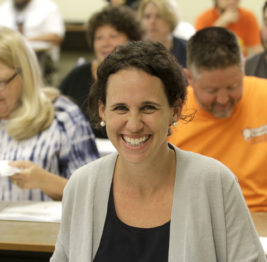
-
Prerequisites
-
Candidates for the M.A.C.E. program normally must have received a bachelor’s degree (B.A. or B.S.) from a four-year college or university accredited by one of the regional accrediting agencies in the United States or hold an equivalent educational credential from another country.
An interview with a member of the faculty is required. There are two ways in which you may interview: by Zoom or by phone. Please contact Admissions at 804-278-4221 or by email at admissions@upsem.edu to arrange your interview.
-
-
Residency & Time Requirements
-
The M.A.C.E. program ordinarily requires a minimum of two years of full-time study on the Richmond campus, Charlotte campus, or fully online.
-
-
Course Requirements
-
- Bible (6 hours)
- BIBL101 – Biblical Interpretation – Old Testament (for MACE)
- BIBL102 – Biblical Interpretation – New Testament (for MACE)
- Theology (3 hours)
- THEO110: Theology for MACE
- Supervised Ministry (6 hours)
- SVCE101 – Christian Education Internship I
- SVCE201 – Christian Education Internship II
- Education Core (9 hours)
- Educational Theory (choose one)
- EDTH110 – The Teaching Ministry of the Church
- EDTH210 – Models of Teaching
- EDTH220 – Contemporary Theology & Education
- EDTH310 – Theory for Education in Religion
- EDTH320 – Spiritual Theology & Christian Education
- Faith Formation (choose one)
- FTHF110 – Ministry with Children and Families
- FTHF111 – Nurturing Child & Adolescent Spirituality
- FTHF120 – Adult Religious Education
- FTHF130 – Digital Culture & Spirituality
- FTHF210 – Faith & Human Development
- Educational Practices (choose one)
- EDPR110 – Curriculum & Resources for Christian Education
- EDPR120 – The Christian Life
- EDPR130 – Community Engaged Teaching & Learning
- EDPR131 – Christian Teaching & the Public Realm
- EDPR210 – Teaching the Bible
- Educational Theory (choose one)
- General Electives (9 hours)
- Students may choose 3 general elective courses from among Union courses.
- Integrative Project (3 hours)
- PROJ101 – Christian Education Integrative Project
- Total 36 hours
- Bible (6 hours)
-
Master of Divinity (M.Div.)
Charlotte & Richmond CampusesStudents come to seminary for the M.Div. degree program in search of knowledge, skills for ministry, and a profound experience in community of the gospel’s liberating power. Graduates of the Master of Divinity program serve in various capacities and ministerial settings: churches, camps, hospitals, schools, non-profit organizations, conference centers, and ecclesial governing bodies. UPSem has a placement rate of 92% within the first 12 months. (Facts & Figures)
Beginning in Summer 2017, we will offer two pathways to the Master of Divinity degree. Biblical languages will no longer be required to complete the degree. However, the biblical languages will still be available to students who choose, or are required by their denomination, to complete those courses. The degree program, with or without the languages, will be 81 credit hours.
Financial aid is available for M.Div. students on both campuses.
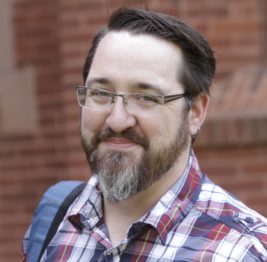
-
Prerequisites
-
Candidates for the M.Div. program normally must have received a bachelor’s degree (B.A. or B.S.) from a four-year college or university accredited by one of the nationally-recognized regional accrediting agencies in the United States, or hold an equivalent educational credential from another country.
An interview with a member of the faculty is required. There are two ways in which you may interview: by Zoom or by phone. Please contact Admissions at 804-278-4221 or by email at admissions@upsem.edu to arrange your interview.
-
-
Residency & Time Requirements
-
The M.Div. program ordinarily takes at least three years to complete on the Richmond campus, or five years on the Charlotte campus.
-
-
Course Requirements - English Exegesis
-
- Bible (12 hours)
- BIBL110 – Old Testament I
- BIBL120 – New Testament I
- BIBL210 – Old Testament II
- BIBL220 – New Testament II
- History, Theology, Ethics (15 hours)
- HIST101 – History I
- HIST201 – History II
- THEO101 – Theology I
- THEO201 – Theology II
- ETHC101 – Introduction to Christian Ethics
- Preaching & Worship (6 hours)
- PRAW100 Introduction to Christian Worship
- PRAW200 Introduction to Preaching & Public Proclamation
- Pastoral Care (3 hours)
- PCAC101 Introduction to Pastoral Care
- Christian Education (3 hours)
- Choose either one Educational Theory course (indicated by an EDTH course number) or one Faith Formation course (indicated by a FTHF course number).
- Church in the World (6 hours)
- Choose two Church in the World courses (indicated by a CITW course number with some exceptions; email the Registrar’s Office for a full list).
- Supervised Ministry (6 hours)
- SVMN101 – Supervised Ministry Internship I
- SVMN201 – Supervised Ministry Internship II
- Elective courses (30 hours)
- Students may choose 10 general elective courses from among Union courses.
- Total 81 hours
- Bible (12 hours)
-
-
Course Requirements - Hebrew/Greek Exegesis
-
- Bible (12 hours)
- LANG110 – Hebrew I
- LANG120 – Greek I
- LANG210 – Hebrew II
- LANG220 – Greek II
- Bible (12 hours)
- BIBL201 – Old Testament I
- BIBL202 – New Testament I
- BIBL301 – Old Testament II
- BIBL302 – New Testament II
- History, Theology, & Ethics (15 hours)
- HIST101 – History I
- HIST201 – History II
- THEO101 – Theology I
- THEO201 – Theology II
- ETHC101 – Introduction to Christian Ethics
- Preaching & Worship (6 hours)
- PRAW100 Introduction to Christian Worship
- PRAW200 Introduction to Preaching & Public Proclamation
- Pastoral Care (3 hours)
- PCAC101 Introduction to Pastoral Care
- Christian Education (3 hours)
- Choose either one Educational Theory course (indicated by an EDTH course number) or one Faith Formation course (indicated by a FTHF course number).
- Church in the World (6 hours)
- Choose two Church in the World courses (indicated by a CITW course number with some exceptions; email the Registrar’s Office for a full list).
- Supervised Ministry (6 hours)
- SVMN101 -Supervised Ministry Internship I
- SVMN20 1- Supervised Ministry Internship II
- General Electives (18 hours)
- Students may choose 6 general elective courses from among Union courses.
- Total 81 hours
- Bible (12 hours)
-
Master of Divinity/Master of Arts in Christian Education (M.Div./M.A.C.E.)
Charlotte & Richmond CampusesStudents in this program plan to make Christian education a significant part of their ministry, whether or not they seek ordination.
Dual degrees graduates serve as associate pastors of Christian education, youth ministers, hospital chaplains, campus ministers, camp and conference directors, “solo” pastors with a full range of responsibilities, and in other roles.
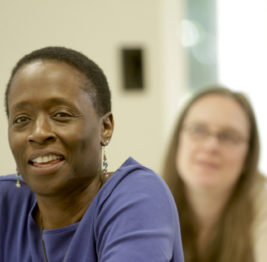
-
Prerequisites
-
Candidates for the M.Div./M.A.C.E. program normally must have received a bachelor’s degree (B.A. or B.S.) from a four-year college or university accredited by one of the nationally recognized regional accrediting agencies in the United States, or hold an equivalent educational credential from another country.
An interview with a member of the faculty is required. There are two ways in which you may interview: by Zoom or by phone. Please contact Admissions at 804-278-4221 or by email at admissions@upsem.edu to arrange your interview.
-
-
Residency & Time Requirements
-
Students may earn both a Master of Arts in Christian Education degree and a Master of Divinity degree (M.Div./M.A.C.E.) in four years on the Richmond campus, or five to six years on the Charlotte campus.
-
-
Course Requirements - English Exegesis
-
- Bible (12 hours)
- BIBL110 – OldTestament I
- BIBL120 – NewTestament I
- BIBL210 – OldTestament II
- BIBL220 – NewTestament II
- History, Theology, & Ethics (15 hours)
- HIST101 – History of Christianity I
- HIST201 – History of Christianity II
- THEO101 – Theology I
- THEO201 – Theology II
- ETHC101 – Introduction to Christian Ethics
- Preaching & Worship (6 hours)
- PRAW100 Introduction to Christian Worship
- PRAW200 Introduction to Preaching & Public Proclamation
- Pastoral Care (3 hours)
- PCAC101 Introduction to Pastoral Care
- Education Core (4 courses- one from each of the three subcategories plus one of your choice) (12 hours)
- Educational Theory (choose at least one)
- EDTH110 – The Teaching Ministry of the Church
- EDTH210 – Models of Teaching
- EDTH220 – Contemporary Theology & Education
- EDTH310 – Theory for Education in Religion
- EDTH320 – Spiritual Theology & Christian Education
- Faith Formation (choose at least one)
- FTHF110 – Ministry with Children and Families
- FTHF111 – Nurturing Child & Adolescent Spirituality
- FTHF120 – Adult Religious Education
- FTHF130 – Digital Culture & Spirituality
- FTHF210 – Faith & Human Development
- Educational Practices (choose at least one)
- EDPR110 – Curriculum & Resources for Christian Education
- EDPR120 – The Christian Life
- EDPR130 – Community Engaged Teaching & Learning
- EDPR131 – Christian Teaching & the Public Realm
- EDPR210 – Teaching the Bible
- Educational Theory (choose at least one)
- Church in the World (6 hours)
- Choose two Church in the World courses (indicated by a CITW course number with some exceptions; email the Registrar’s Office for a full list).
- Supervised Ministry (12 hours)
- SVMN101 – Supervised Ministry Internship I
- SVMN201 – Supervised Ministry Internship II
- SVCE101 – Christian Education Internship I
- SVCE201 – Christian Education Internship II
- General Electives (30 hours)
- Students may choose 10 general elective courses from among Union courses.
- Integrative Project (3 hours)
- PROJ101 – Christian Education Integrative Project
- Total 99 hours
- Bible (12 hours)
-
-
Course Requirements - Hebrew/Greek Exegesis
-
- Languages (12 hours)
- LANG110 – Hebrew I
- LANG120 – Greek I
- LANG210 – Hebrew II
- LANG220 – Greek II
- Bible (12 hours)
- BIBL201 – Old Testament I
- BIBL202 – New Testament I
- BIBL301 – Old Testament II
- BIBL302- New Testament II
- History, Theology, & Ethics (15 hours)
- HIST101 – History of Christianity I
- HIST201 – History of Christianity II
- THEO101 – Theology I
- THEO201 – Theology II
- ETHC101 – Introduction to Christian Ethics
- Preaching & Worship (6 hours)
- PRAW100 Introduction to Christian Worship
- PRAW200 Introduction to Preaching & Public Proclamation
- Pastoral Care (3 hours)
- PCAC101 Introduction to Pastoral Care
- Education Core (4 courses- one from each of the three subcategories plus one of your choice) (12 hours)
- Educational Theory (choose at least one)
- EDTH110 – The Teaching Ministry of the Church
- EDTH210 – Models of Teaching
- EDTH220 – Contemporary Theology & Education
- EDTH310 – Theory for Education in Religion
- EDTH320 – Spiritual Theology & Christian Education
- Faith Formation (choose at least one)
- FTHF110 – Ministry with Children and Families
- FTHF111 – Nurturing Child & Adolescent Spirituality
- FTHF120 – Adult Religious Education
- FTHF130 – Digital Culture & Spirituality
- FTHF210 – Faith & Human Development
- Educational Practices (choose at least one)
- EDPR110 – Curriculum & Resources for Christian Education
- EDPR120 – The Christian Life
- EDPR130 – Community Engaged Teaching & Learning
- EDPR131 – Christian Teaching & the Public Realm
- EDPR210 – Teaching the Bible
- Educational Theory (choose at least one)
- Church in the World (6 hours)
- Choose two Church in the World courses (indicated by a CITW course number with some exceptions; email the Registrar’s Office for a full list).
- Supervised Ministry (12 hours)
- SVMN101 – Supervised Ministry Internship I
- SVMN201 – Supervised Ministry Internship II
- SVCE101 – Christian Education Internship I
- SVCE201 – Christian Education Internship II
- General Electives (18 hours)
- Students may choose 6 general elective courses from among Union courses.
- Integrative Project (3 hours)
- PROJ101 – Christian Education Integrative Project
- Total 99 hours
- Languages (12 hours)
-
Master of Arts in Public Theology (M.A.P.T.)
Charlotte & Richmond CampusesThe purpose of the M.A.P.T. degree program is to deepen the capacity of individuals engaging in Public Theology, a field which draws on biblical, historical, theological, ethical, and practical resources of the Christian faith in order to serve the common good of society. The program is designed for students already engaging issues such as public policy, ecological concerns, economic justice, gender issues, inter-religious dialogue, and issues of race and reconciliation, or planning to make these or similar issues a focus of their future work.
The M.A.P.T. program is related to the work of Union Presbyterian Seminary’s three Centers: the Center for Social Justice and Reconciliation, the Katie Geneva Cannon Center for Womanist Leadership, and the Syngman Rhee Global Mission Center for Christian Education.
The M.A.P.T. program consists of 36 credit hours, making it possible for students to complete the degree in 2 years.
If you would like more information about the M.A.P.T. degree, contact our Admissions office at 804-278-4221 in Richmond or 980-636-1662 in Charlotte.

-
Prerequisites
-
Candidates for the M.A.P.T. program normally must have received a bachelor’s degree (B.A. or B.S.) from a four-year college or university accredited by one of the regional accrediting agencies in the United States or hold an equivalent educational credential from another country.
An interview with a member of the faculty is required. There are two ways in which you may interview: by Zoom or by phone. Please contact Admissions at 804-278-4221 or by email at admissions@upsem.edu to arrange your interview.
-
-
Residency & Time Requirements
-
The M.A.P.T. degree utilizes a hybrid format and relies largely on the use of technology as an instructional medium, with the expectation of 9 hours of in-person instruction for the four required area courses.
-
-
Course Requirements
-
- Required areas, with a focus on the public dimension (12 credit hours):
- Bible (3 credit hours)
- Theology or Ethics (3 credit hours)
- History or Missiology (3 credit hours)
- Practical Theology or Christian Education (3 credit hours)
- Center-related courses (9 credit hours): The following list illustrates the kinds of elective courses that may be offered in the program:
- Biennial conference of the Center for Womanist Leadership, with additional requirements for course credit.
- A conference that involves two or all three Centers, with additional requirements for course credit.
- A series of seminars over an academic term offered by the three Centers.
- A course that brings together the foci of the three Centers, with additional requirements for course credit.
- Courses offered by faculty that tie into the work of one or more Centers.
- Courses by qualified practitioners that are related to the three Centers.
- Travel seminar (3 credit hours)
- Students to whom this presents a hardship could request a waiver from the academic dean and substitute an appropriate elective in relation to the work of one of the three Centers.
- Electives (6 credit hours)
- Students may select courses in relation to any of the areas of our curriculum or the work of the three centers. Students may propose one directed study per year, under extraordinary circumstances, under the provisions of the academic catalog.
- Final project (6 credit hours)
- The final project may consist of field-based learning, an independent research project, an integrative project, or a combination of these.
- Required areas, with a focus on the public dimension (12 credit hours):
-
Master of Divinity/Master of Arts in Public Theology (M.Div./M.A.P.T.)
Charlotte & Richmond CampusesStudents in this program plan to make public theology (i.e., theology serving the common good) a significant part of their ministry, whether or not they seek ordination.
Dual degrees graduates may serve as pastors and/or workers in various forms of public ministry, including advocacy work for causes such as those related to public policy, ecological concerns, economic justice, gender issues, inter-religious dialogue, and issues of race and reconciliation.

-
Prerequisites
-
Candidates for the M.Div./M.A.P.T. program normally must have received a bachelor’s degree (B.A. or B.S.) from a four-year college or university accredited by one of the nationally- recognized regional accrediting agencies in the United States, or hold an equivalent educational credential from another country.
An interview with a member of the faculty is required. There are two ways in which you may interview: by Zoom or by phone. Please contact Admissions at 804-278-4221 or email admissions@upsem.edu, to arrange your interview.
-
-
Residency & Time Requirements
-
Students may earn both a Master of Arts in Public Theology degree and a Master of Divinity degree (M.Div./M.A.P.T.) in four years on the Richmond campus. The M.Div./M.A.P.T. dual degree consists of 99 credit hours and can be completed in four years. M.Div. courses are primarily in person. Classes for the M.A.P.T. program utilize a hybrid format and relies largely on the use of technology as an instructional medium, with the expectation of three days of in-person instruction for the required area courses during reading week of the fall and spring semesters, and some in-person contact for some of the Center-related courses.
-
-
Course Requirements
-
- MDIV Core Curricular Competencies (51 credit hours)
- Old Testament (6 credit hours)
- New Testament (6 credit hours)
- Theology (6 credit hours)
- History of Christianity (6 credit hours)
- Christian Ethics (3 credit hours)
- Preaching and Worship (6 credit hours)
- Education (3 credit hours)
- Pastoral Care (3 credit hours)
- Supervised Ministry (6 credit hours)
- Church in the World (6 credit hours) – may be met by MAPT requirements in relation to the work of the Centers and the travel seminar; this would allow for 6 additional hours of electives
- MDIV Electives (24 credit hours)
- #1 and #2: Hebrew Option (6 credit hours)
- #3 and #4: Greek Option (6 credit hours)
- Course #5 (3 credit hours)
- Course #6 (3 credit hours)
- Course #7 (3 credit hours)
- Course #8 (3 credit hours)
- MAPT COMPONENTS (24 credit hours)
- Required areas, with a focus on the public dimension (9 credit hours): choose 3 from the following areas:
- Bible (3 credit hours)
- Theology or Ethics (3 credit hours)
- History or Missiology (3 credit hours)
- Practical Theology or Christian Education (3 credit hours)
- Center-related courses (9 credit hours): choose 3 courses that are related to the work of the Centers. The following list illustrates the kinds of elective Center-related courses that may be offered:
- Biennial conference of the Center for Womanist Leadership, with additional requirements for course credit.
- A conference that involves two or all three Centers, with additional requirements for course credit.
- A series of seminars over an academic term offered by the three Centers.
- A course that brings together the foci of the three Centers, with additional requirements for course credit.
- Courses offered by faculty that tie into the work of one or more Centers.
- Courses by qualified practitioners that are related to the three Centers.
- Travel seminar (3 credit hours)
- Students to whom this present a hardship could request a waiver from the academic dean and substitute an appropriate elective in relation to the work of one of the three Centers.
- Final project (3 credit hours)
- The final project may consist of field-based learning, an independent research project, an integrative project, or a combination of these.
- Required areas, with a focus on the public dimension (9 credit hours): choose 3 from the following areas:
- MDIV Core Curricular Competencies (51 credit hours)
-
Master of Arts in Christian Education/Master of Arts in Public Theology (M.A.C.E./M.A.P.T.)
Charlotte & Richmond CampusesStudents in this program plan to make both Christian Education and Public Theology (i.e., theology serving the common good) a significant part of their ministry.
Dual degrees graduates may serve as Christian Educators and/or workers in various forms of public ministry, including advocacy work for various causes such as those related to public policy, ecological concerns, economic justice, gender issues, inter-religious dialogue, and issues of race and reconciliation.

-
Prerequisites
-
Candidates for the M.A.C.E./M.A.P.T. program normally must have received a bachelor’s degree (B.A. or B.S.) from a four-year college or university accredited by one of the nationally- recognized regional accrediting agencies in the United States, or hold an equivalent educational credential from another country.
An interview with a member of the faculty is required. There are two ways in which you may interview: by Zoom or by phone. Please contact Admissions at 804-278-4221 or by email at admissions@upsem.edu to arrange your interview.
-
-
Residency & Time Requirements
-
The M.A.C.E./M.A.P.T. dual degree consists of 60 credit hours, and can be completed in three years. The M.A.C.E. program ordinarily requires a minimum of two years of full-time study o the Richmond campus. Classes for the M.A.P.T. program utilize a hybrid format and relies largely on the use of technology as an instructional medium, with the expectation of three days of full-time study on the Richmond campus. On the Charlotte campus, the M.A.C.E. program ordinarily requires two years of part-time study. In-person instruction on the Richmond campus for the required area courses during reading week of the fall and spring semesters, and some in-person contact for some of the Center-related courses.
-
-
Course Requirements
-
- M.A.C.E.-only components (27 credit hours)
- Bible/Theology Core (9 credit hours)
- Old Testament (3 credit hours)
- New Testament (3 credit hours)
- Theology (3 credit hours)
- Education Core (9 credit hours)
- Educational Theories (3 credit hours)
- Faith Formation (3 credit hours)
- Education Practices (3 credit hours)
- Supervised Ministry (6 credit hours)
- Integrative Project (3 credit hours)
- Bible/Theology Core (9 credit hours)
- M.A.P.T.-only components (24 credit hours)
- Required areas, with a focus on the public dimension (9 credit hours): choose 3 from the following areas:
- Bible (3 credit hours)
- Theology or Ethics (3 credit hours)
- History or Missiology (3 credit hours)
- Practical Theology or Christian Education (3 credit hours)
- Center-related courses (9 credit hours): choose 3 courses that are related to the work of the Centers. The following list illustrates the kinds of elective courses that may be offered in the program:
- Biennial conference of the Center for Womanist Leadership, with additional requirements for course credit.
- A conference that involves two or all three Centers, with additional requirements for course credit.
- A series of seminars over an academic term offered by the three Centers.
- A course that brings together the foci of the three Centers, with additional requirements for course credit.
- Courses offered by faculty that tie into the work of one or more Centers.
- Courses by qualified practitioners that are related to the three Centers.
- Travel seminar (3 credit hours)
- Students to whom this present a hardship could request a waiver from the academic dean and substitute an appropriate elective in relation to the work of one of the three Centers.
- Final project (3 credit hours)
- The final project may consist of field-based learning, an independent research project, an integrative project, or a combination of these.
- Required areas, with a focus on the public dimension (9 credit hours): choose 3 from the following areas:
- Electives (9 credit hours)
- Students may select courses in relation to any of the areas of our curriculum or the work of the three centers. Students may propose one directed study per year, under extraordinary circumstances, under the provisions of the academic catalog.
- M.A.C.E.-only components (27 credit hours)
-
Certificate Program in Christian Education (C.C.E.)
Charlotte & Richmond CampusesThe purpose of the Certificate Program in Christian Education is to engage students in focused study of best practices in educational ministry. Students will develop competencies in three core areas of Christian Education: Educational Theory, Faith Formation and Educational Practices. This coursework will provide opportunities for enriched understanding of educational ministries and pedagogical practices that nurture relevant and dynamic faith in a changing Church and world.
The Certificate program is designed for persons engaged in educational ministry in congregations and other organizations, as well as those considering such ministries. The flexibility in course selection offers opportunities for educators, pastors and congregational leaders with various levels of educational experience. This flexibility also allows those seeking Educator Certification in the Presbyterian Church (USA) to choose courses that assist in meeting the requirements of that process.
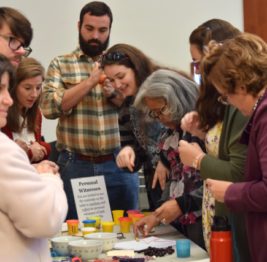
-
Prerequisites
-
Candidates for the admission to the Certificate Program in Christian Education normally must have received a bachelor’s degree (B.A. or B.S.) from a four-year college or university accredited by one of the nationally- recognized regional accrediting agencies in the United States, or hold an equivalent educational credential from another country.
-
-
Residency & Time Requirements
-
Courses in this certificate program are available in residential, hybrid, and online learning modalities. Ordinarily, this program must be completed within two years.
-
-
Course Offerings
-
- A student must complete 12 semester credit hours and meet the course requirements detailed below. As courses are completed, students will be awarded academic credit that may be applied to a degree program at Union Presbyterian Seminary or possibly transferred elsewhere.
- Core Competency Areas (9 hours, 3 courses)
- Students must complete one course in each of three core competency areas:
- Faith Formation
- Educational Theory
- Educational Practices
- Elective in Christian Education (3 hours, 1 course)
-
Certificate Program in Public Theology (C.P.T.)
Charlotte & Richmond CampusesThe purpose of the Certificate Program in Public Theology is to deepen the capacity of individuals engaging in public theology, a field that draws upon the resources of the Christian faith in order to serve the common good of society. The Certificate Program is designed for students who are either already engaging in, or plan to engage issues such as public policy, ecological concerns, economic justice, gender issues, inter-religious dialogue, and issues of race and reconciliation, but who do not wish to pursue a degree program. The program consists of 12 credit hours (3 courses in relation to the work of the Centers and a travel seminar).
Cost: $500 per course.
If you would like more information about the Certificate in Public Theology, contact our admissions office at 804-278-4221 in Richmond.

-
Prerequisites
-
Candidates for the Certificate Program in Public Theology normally must have received a bachelor’s degree (B.A. or B.S.) from a four-year college or university accredited by one of the regional accrediting agencies in the United States or hold an equivalent educational credential from another country. Conditional enrollment for those with significant life experience may also be considered.
As courses are completed, students will be awarded academic credit that may be applied to a degree program at Union Presbyterian Seminary or transferred elsewhere.
-
-
Residency & Time Requirements
-
Courses in Public Theology utilize a hybrid format and rely largely on the use of technology as an instructional medium.
-
-
Course Offerings
-
- Center-related courses (9 credit hours): The following list illustrates the kinds of elective courses that may be offered in the certificate program. Choose 3 courses that are related to the work of the Centers:
- Biennial conference of the Center for Womanist Leadership, with additional requirements for course credit.
- A conference that involves two or all three Centers, with additional requirements for course credit.
- A series of seminars over an academic term offered by the three Centers.
- A course that brings together the foci of the three Centers, with additional requirements for course credit.
- Courses offered by faculty that tie into the work of one or more Centers.
- Courses by qualified practitioners that are related to the three Centers.
- Travel seminar (3 credit hours)
- Center-related courses (9 credit hours): The following list illustrates the kinds of elective courses that may be offered in the certificate program. Choose 3 courses that are related to the work of the Centers:
-
Master of Theology (Th.M.)
Richmond CampusAll Th.M. students will successfully complete 30 semester hours, including a Research Methods course, a Th.M.-specific seminar, and a year-long colloquium. These and all other courses and directed studies are designed to prepare every Th.M. student to write a thesis or summative projects and to construct a final portfolio. Some Th.M. students may choose to concentrate their studies in a particular field (e.g. New Testament, Christian History), while others may draw upon the resources of various departments.
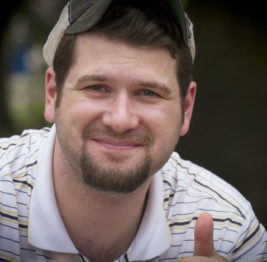
-
Prerequisites
-
Applicants for admission to the Master of Theology program must hold a bachelor’s degree, or its equivalent, from a four-year college or university accredited by one of the nationally recognized regional accrediting agencies or the international equivalent, and must have received a master’s degree in an appropriate discipline from a seminary or university accredited by the Association of Theological Schools in the United States and Canada or its international equivalent.
Please reach out to the Richmond Director of Admissions, Rev. Annie Franklin Arvin and the Th.M. Program Director, Dr. Samuel Adams before applying to the Th.M. program
-
-
Residency & Time Requirements
-
All enrollments in the Th.M. program must begin in the fall term and the degree is normally completed in one academic year.
-
-
Course Requirements
-
All Th.M. students will successfully complete 30 semester hours, including a Research Methods course, a Th.M.-specific seminar, and a year-long colloquium. These and all other courses and directed studies are designed to prepare every Th.M. student to write a thesis or summative projects and to construct a final portfolio. Some Th.M. students may choose to concentrate their studies in a particular field (e.g. New Testament, Christian History), while others may draw upon the resources of various departments.
-
-
Th.M. Faculty Advisory Areas
-
Th.M. studies are coordinated by the student’s faculty advisor and the director of graduate programs. Th.M. faculty advisors and their areas of interest include:
Samuel L. Adams
Death and the Afterlife in the Bible and Ancient Judaism
Wealth and Poverty in the Biblical World and Today
Wisdom Literature
The Bible and Film
The Bible and American Political Discourse
Apocalypticism Past and PresentRubén Arjona
Pastoral care of men
Pastoral care of couples and families
Pastoral care of LGBTQ+ individuals
Pastoral theology
Erik H. Erikson’s life and work
John Calvin and pastoral theology
Latin American & Latinx liberation theologiesRachel Sophia Baard
Systematic theology
Constructive theology
Public theology
Feminist theologies
Political theologies
The intersection of theology and ethicsJohn T. Carroll
New Testament Gospels
Parables of Jesus
Luke-Acts
Romans
Theology of Paul
Bible and Culture
Bible and Social Justice
New Testament Ethics
Disability Studies and the New Testament
Jesus in World ReligionsFrances Taylor Gench
Gospels
Women in the Biblical World and Feminist Biblical Criticism
Global and Intercultural Perspectives on the Bible
Issues of Biblical Authority and InterpretationMelanie Jones Quarles
Womanist Thought
Christian Social Ethics
African American Religious History
Black Popular Culture
Millennials and Religion
Faith and Social Entrepreneurship
Lakisha Lockhart
Womanist Theology and Leadership
Black Popular Culture
Christian Education
Practical Theology
Youth Ministry & Faith Formation
Theological Aesthetics
Embodied Faith
Intersections of Art, Play, & Theology/SpiritualityChristine Luckritz Marquis
Early and Late Ancient Christianities
Violence and Religion
Memorialization and Erasure
Ascetics, Monastics, Mystics
Race and Ethnicity
Food and Body in the Ancient/Late Ancient World
Jewish, Christian, Muslim Relations before the Enlightenment
Place, Space, and PilgrimageSafwat Marzouk
Monsters in the Bible and the Ancient Near East
Migration in the Bible, the Church, and the World
Biblical Hermeneutics and History of Interpretation
Intercultural Churches and ministries
The Religious Other in the Bible
The book of Exodus
The book of Ezekiel
Biblical Foundations for Peace and JusticeJames Taneti
Ecumenics
Christianity’s Interface with Other Religions
Women and Children in Missionary LiteratureRichard W. Voelz
Contemporary Homiletic Theory
Ethics of Preaching
Preaching Identity
Preaching and Context(s)
Preaching & YouthKaren-Marie Yust
Children, families and faith formation
Digital culture and spirituality
Popular culture and spirituality
Contemporary Christian practices
-
-
Previous/Current Th.M. student research topics
-
- Developmental frameworks for baptism and confirmation education with families
- Gospel Healing Narratives and Ministry Contexts
- Paul’s Concept of Food Offered to Idols in 1 Corinthians 8:1–13 and Its Interpretation in the Krobo Religio-Cultural Setting
- Augustine and race/ethnicity across history
- Evil, the Church, and incarceration
- Black Effect: The Control and Demonization of the Black body
- The Culture of Peace and the Important Role of Non-Government Organizations
- Violence Against Women
- The Challenges of Work and Motherhood
- The Role of Jesus’ Humanity in Transcending Gender Identification
- I Am Not Who I Am Thought to Be’: Speaking for the Self in Job 7-10
- Ethics and the Hebrew Bible: Recent Developments and Questions for the Future
- A Traumatizing Lament: Reading Lamentations 1 and Poems Written by Syrians in Exile through Trauma Theory
- Learning to Lament Again: Imagining Lament As a Resource for the Contemporary Church”
- The Son of Man Must Suffer . . .’: Suffering and Power in the Gospel of Mark
- Mending a Broken Heart: Biblical, Pastoral Care and Eschatological Perspectives on Child Loss
- The Incarnational Mission of God in the Fourth Gospel: Its Significance and Implications for the Christian Mission in the Indian Context with Special Reference to Hinduism
- How the Song of Songs, an ancient love poem applies to the practice of ministry today
-
Doctor of Ministry (D.Min.)
Charlotte & Richmond CampusesD.Min. cohorts alternate between the Charlotte and Richmond campuses. The Fall 2023 cohort will be located in Charlotte. The Fall 2024 cohort will be located in Richmond. The Fall 2025 cohort will be located in Charlotte.
In our Doctor of Ministry program, students will articulate advanced understanding of the contemporary church and expressions of culture, and relationships between the two. The degree will enhance ministry competencies in areas such as proclamation, evangelism, education, interfaith relations, and community advocacy and engagement based on personal and vocational interests. Students will gain a deepened capacity for theological reflection on the practices of ministry, especially with respect to social justice and witness.
The Doctor of Ministry degree is an advanced professional doctorate that builds upon an accredited master’s degree in a ministry-related area and upon significant ministry experience.
Total tuition for this multi-year degree program is $10,000. Students are eligible for need-based aid.
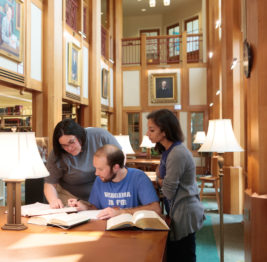
-
Prerequisites
-
Applicants for admission to the Doctor of Ministry program must hold a bachelor’s degree or its equivalent from a four-year college or university accredited by one of the nationally recognized regional accrediting agencies or the international equivalent. Applicants must have completed an accredited master’s degree in a ministry-related area from a seminary or university accredited by the Association of Theological Schools in the United States and Canada or its international equivalent. Applicants without an accredited Master of Divinity degree may be admitted, provided applicants meet each of these criteria: (a) the ability to thoughtfully interpret scripture and the theological tradition of one’s ministry context, (b) the capacity to understand and adapt one’s ministry to the cultural context, (c) a basic self-understanding of one’s ministerial identity and vocational calling, (d) a readiness to engage in ongoing personal and spiritual formation for one’s ministry, (e) an accredited master’s degree (or its educational equivalent) in an area related to one’s ministry setting or vocational calling, and (f) significant ministerial experience that enables the applicant to engage as a ministry peer with other students in this advanced professional doctorate. Ordination is not a requirement.
-
-
Residency & Time Requirement
-
The D.Min. program ordinarily takes three to four years to complete. In Charlotte, courses will include short weekday on-campus intensive sessions several times per academic term paired with online work. In Richmond, courses will feature one-week, on-campus intensive sessions paired with online work.
-
-
Cohorts
-
The faculty at Union Presbyterian Seminary are deeply invested in their students and wish to fully engage and support the Doctor of Ministry students. Due to their commitment to students and the size of the faculty, cohorts will be intentionally small.
-
-
Course Requirements
-
The degree requires 30 credit hours comprised of 6 hybrid classes, 1 online course, and 3 project based courses.
Year 1, Fall term: two foundational courses
- Ecclesiology in World Christian Perspective (3 credit hours)
- The World in and around the Church (3 credit hours)
Year 1, Spring term: two required courses
- Research Methods Seminar (3 credit hours; online format)
- Mini-project Seminar (3 credit hours; students work with faculty mentors through the semester; at the conclusion of the course students come to campus to share their research with student peers in their cohort)
Year 2: four elective courses (3 credit hours each; hybrid format; illustrative examples below)
- Educational Theory for Justice and Advocacy
- Liberation Theology and Ethics
- Pastoral Care in Conflicted Relationships
- Thinking Theologically about Money
- Enslavement, Race, and Caste
- Preaching for Transformation
- The Passions of the Christ
- Advanced Topics in Pastoral Care
- Intercultural Church: A Biblical Vision in an Age of Migration
- Parables and Contemporary Culture
Year 3: Integrative project in consultation with advisor (6 credits)
Year 4: Integrative project in consultation with advisor (if needed; at the conclusion of their program, in either Year 3 or Year 4, students will come to campus to share their research with other final-stage candidates for the degree)
-








